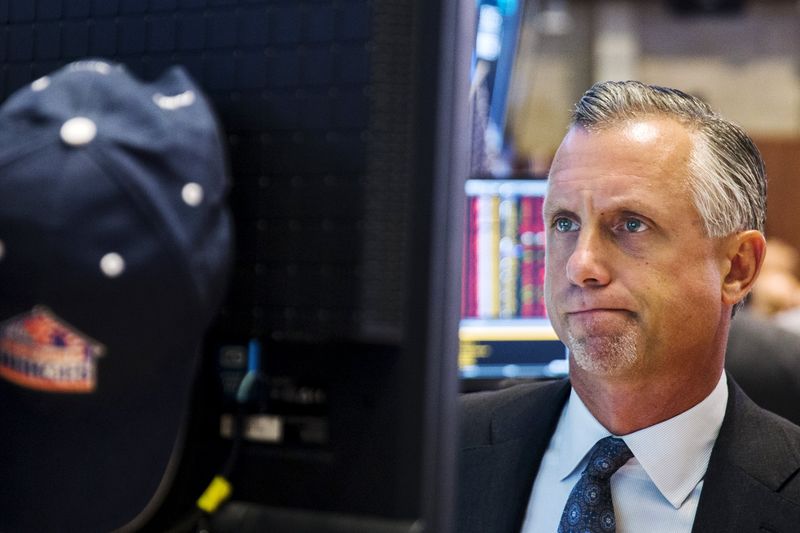(Bloomberg) -- The financial-market turmoil seen on Friday in the wake of the escalation in U.S.-Iran tensions lasted all of one trading session. Come Wednesday, strategists are warning the impact of deteriorating Middle East security could be more lasting.
“The market didn’t price the chance of a major conflict high enough when the U.S. drone strike happened,” said Max Gokhman, head of asset allocation at Pacific Life Fund Advisors in Newport Beach, California, referring to Friday’s U.S. killing of Iranian General Qassem Soleimani. “Now it’s more clear the situation won’t de-escalate and fear is replacing hope in investors’ minds.”
Even after Iran warned it would retaliate, stocks and bond yields rose on Monday, and put in a muted trading session on Tuesday. When Iran followed through with an attack on two U.S. targets in Iraq, the market reaction paralleled last Friday’s moves. Oil, gold, the Japanese yen and U.S. Treasuries jumped. U.S. stock futures tumbled, along with equity benchmarks from Japan and South Korea to Australia.
Here are some comments from market participants in the wake of the Iranian strike Wednesday morning Asia time:
Markets Were Unprepared
“The key point is that the market was in no condition for bad news of any kind,” said Doug Ramsey, chief investment officer at Leuthold Group. “The market was bound to react badly to anything less than the best news on the economy, trade war, and even geopolitical tensions.”
“We are positioned right in the middle of our normal 30-70% range for equities in our tactical funds. We do not plan to buy to any dip potentially created by this escalation. Rather, we’d be inclined to sell into a first quarter melt-up if one develops,” he said.
Take on Hedges
“We are doing much more hedging to cut the risks in our portfolio,” said Jackson Wong, asset management director at Amber Hill Capital Ltd. “The main thing we’d do is to buy more derivatives related to some ETFs and indexes to hedge against further declines of the general market.”
“No doubt the stocks related to gold and oil will perform better in the short-term, but I’d be cautious to chase it since the bearish situation might change quickly and I’m not that worried yet,” he said.
Don’t Call a Level
“History cautions against picking levels for the yen in instances of sharply heightened geopolitical tension (other than to expect support in the 100 area on fears of Bank of Japan intervention),” said Ray Attrill, head of foreign-exchange strategy in Sydney at National Australia Bank Ltd.
Buying the yen against the Australian and New Zealand dollars is the preferred way to trade geopolitical developments, he said. Dollar-yen is “quite fairly valued here near 108,” but could test support around 107 “if the negative news flow intensifies,” he said.
Trumping Trade War
“Iran has replaced the trade war as the biggest risk to markets -- 2020 has been hijacked by escalating Middle East tensions and investors will be re-positioning their portfolios to reflect this,” said Shane Oliver, head of investment strategy in Sydney at AMP Capital. The yen could strengthen to 105 per dollar, but it would require “serious intensification” of the situation to test that level, he said.
Buy U.S. Stocks
“I would still be buying U.S. equities,” said Stefan Hofer, chief investment strategist at LGT Bank Asia. “I wouldn’t want to be too brave at this moment. But I mean, we think about the U.S. consumer, the labor market report will be out I think at the end of this week is probably going to be quite decent. Wage growth is strong, earnings are going to be improving into the first quarter.”
“If we can just set aside the whole political risk issue, ultimately on fundamentals the U.S. is the place to be,” Hofer said.
Wait and See
“I don’t expect to adjust my positions” in Chinese stocks, said Raymond Chen, a portfolio manager with Keywise Capital Management (HK) Ltd. “It’s a short-term event amid an economic-recovery trend,” though “it’s possible that there may be misjudgment from both sides” he said, referring to the U.S. and Iran. “I’ll wait and see how things pan out first.”
Yields to Slide
Ten-year U.S. Treasury yields could slide as far as 1.6% in coming weeks or months thanks to further conflict in the Middle East, said Kyle Rodda, a market analyst at IG Markets Ltd. in Melbourne. The risk of outright warfare may still be relatively low, but the key for investors will be any attacks on energy-producing assets, he said. Canada’s dollar is likely to benefit, along with the Japanese yen, he said.
U.S. Reaction
“Much now depends on the U.S. reaction and whether there is further escalation,” said Mitul Kotecha, a senior emerging-markets strategist in Singapore at TD Securities. The missile attacks will likely support core bond markets, mainly U.S. Treasuries. Asian currencies will face some pressure, with the rupee among the more vulnerable thanks to India’s oil-import bill and the climb in energy prices, he said.
Other Incidents?
“The biggest risk to my overall take that this will end up being ‘a buy-the-dip and fade the risk-off wave’ will be if we got another geopolitical event on top of this,” said Kay Van-Petersen, a global macro strategist at Saxo Capital Markets in Singapore. He flagged the potential for incidents involving North Korea or China and Taiwan.
